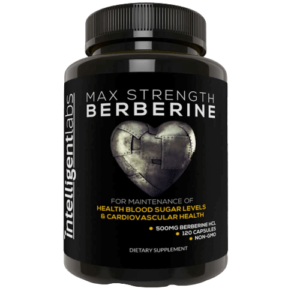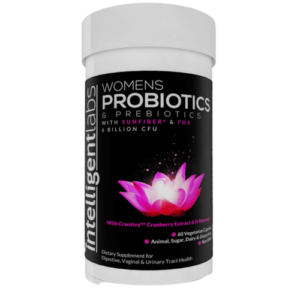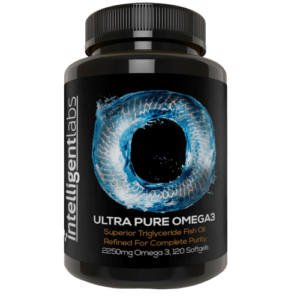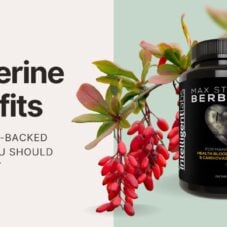Nutrition
PCOS Supplements: 5 Natural Supplements That Help With PCOS
If you’ve been diagnosed with PCOS or polycystic ovarian syndrome, then this article is for you. While there is currently no cure for PCOS, the symptoms can be managed or even eliminated altogether. These 5 natural PCOS supplements we’re sharing with you today have a good track record when it comes to managing PCOS symptoms, so you should hopefully feel better soon.
Table of Contents
What’s PCOS and Why Should You Take Supplements?
PCOS is a complex metabolic condition that stems from high blood sugar and poor insulin sensitivity. It causes severe hormonal imbalance which leads to low estrogen (female hormone) levels and high androgen (male hormone) levels. Because of this, PCOS can cause irregular periods and infertility, which is heartbreaking for women who are hoping to have their own kids someday.
Other distressing symptoms that can severely affect women’s self-esteem are severe acne, uncontrolled weight gain, female pattern baldness, and hirsutism (or hair growth in non-feminine areas). But you know what’s the worst thing about PCOS if left untreated? It can be a risk factor to other serious diseases like type II diabetes, heart disease, and stroke!
Taking medicine for PCOS is helpful, but in many cases, it can cause adverse side effects especially when taken long term. Thus, a more natural PCOS therapy alternative is a better option for many.
5 Natural PCOS Supplements To Help Manage Symptoms
If you’ve been taking medication for PCOS but is unhappy with the side effects or lack of proof that it’s actually working, consider these 5 supplements instead:
1) Berberine
Berberine has shown promise in controlling blood sugar levels in pre-diabetics and type 2 diabetics. It’s also effective at reducing inflammation in the body, normalizing high blood pressure, and lowering cholesterol levels (1).

Our Max Strength Berberine HCL Plus supplement contains 500mg of pure Berberine per capsule. Research shows that 500mg three times daily is the optimum dosage for you to benefit from Berberine. For Berberine to have a positive effect on your blood sugar, you must take the supplement shortly before, during, or after a meal.
Also, it may also take at least 3 weeks of taking 2-3 capsules daily before you see any results. Fortunately, each bottle of Berberine is good for 40 days, so you should see some improvements before you finish off the entire bottle!
Click here to buy our Max Strength Berberine HCL Plus supplement.
2) Women’s probiotics & prebiotics
Gut health plays a key role in treating your PCOS symptoms. It’s therefore important to make sure your gut is as healthy as can be. The gut is, after all, responsible for absorbing nutrients from the food you eat and then breaking it down into tiny particles your body can absorb and use in various bodily functions.

This is where probiotics come in. Probiotics are live cultures of microscopic ‘good’ bacteria that fight the ‘bad’ bacteria in your gut. The ‘bad’ bacteria cause all sorts of problems not just in your gut, but your overall health and wellbeing. If bad bacteria aren’t controlled, their population can easily overpower the good guys and you’ll find yourself getting sick more frequently.
Supplementing with probiotics – or even eating foods with live cultures on it – can help restore balance to your gut. Probiotics help promote healthy digestion, better absorption of the nutrients and minerals from the food you eat, restore balance to your hormones, control inflammation, and overall, improve gut health. For those with PCOS, it gives them a fighting chance to start living a PCOS symptom-free life!
Our Women’s Probiotics & Prebiotics supplement contains 6 billion CFU (or colony-forming units of live bacteria). The prebiotics act as food for the probiotics, so they don’t die off before you get to use it. Additionally, we’ve also added cranberry juice powder and D-mannose to help ensure your feminine health is in tip-top shape!
Click here to buy our Women’s Probiotics & Prebiotics supplement.
3) Omega-3 fatty acids
PCOS causes inflammation in the body. It may not always be visible to the naked eye, but a CRP test can detect any inflammation that is going on in your body. CRP stands for c-reactive protein which is released by the liver whenever inflammation occurs anywhere in the body.

According to a study published in the Journal of Clinical Endocrinology and Metabolism, PCOS patients showed elevated levels of CRP compared to women without PCOS, which means inflammation was present somewhere in the body (the CRP test can’t pinpoint where the inflamed area is). Moreover, the CRP test showed that PCOS patients may be at higher risk of developing cardiovascular disease (2).
Omega-3 is one of the best natural anti-inflammatories around and can help manage PCOS symptoms. For instance, a study on 78 PCOS patients showed that omega-3 fatty acids helped reduce testosterone levels and regulated the women’s menstrual cycle (3). Also, a systematic review of insulin sensitivity and fish oil supplementation concluded that fish oil helped improve insulin sensitivity (4), which is one of the root causes of PCOS. Additionally, both EPA and DHA omega-3 fatty acids help support healthy heart function which can significantly lower the risk of cardiovascular disease.
Our Ultra Pure Omega-3 Fish Oil capsules contain 2250mg of Omega-3 fatty acids per serving. More specifically, it contains 1,224mg of EPA and 816mg of DHA which is the recommended 3:2 ratio for optimal Omega-3 benefits. We also only use high-quality triglyceride fish oil, not the cheaper and lower quality ethyl ester used by other brands.
Click here to buy our Intelligent Labs Ultra Pure Omega-3 Fish Oil supplement.
4) Zinc and Vitamin D3
Zinc is an important nutrient needed by the body, so it can remain healthy and function properly. It helps maintain healthy skin, hair, nails, and bones and helps metabolize various nutrients from the food you eat. It also contributes to female fertility and reproduction – two of the biggest issues that women with PCOS face. By increasing your zinc intake either from food or dietary supplements, your body is better able to develop healthier egg cells and regulate ovarian function (5).
On the other hand, Vitamin D helps promote insulin sensitivity and reduces PCOS symptoms. Vitamin D a.k.a. the ‘sunshine vitamin’ helps regulate reproductive hormones such as progesterone, follicle-stimulating hormone (FSH), and the anti-mullerian hormone (AMH) (6). Unfortunately, Vitamin D deficiency in all age groups is prevalent worldwide. You could try sunbathing, but depending on your skin type, this may cause more harm than good. Skin cancer is no joke, after all.
5) Inositol
Inositol is one of the most popular treatment options for PCOS. But since there are 9 isomeric forms of inositol, which form is actually best for PCOS? Well, a 40:1 ratio of Myo-inositol to D-chiro inositol may be optimal for PCOS treatment as this specific ratio may restore ovulation in patients (7).

Lifestyle Modifications and PCOS Supplements
Supplements do work, but they’re not miracle workers. You don’t just pop a tablet in your mouth and expect results right away. For these supplements to be effective, you also need to do your share by making a few lifestyle modifications. Here are some of them:
- Cut down on sugars and carbohydrates
Eating too many carbs is bad for your health. In fact, it’s one of the main reasons for developing PCOS. When you eat too many carbs, your blood sugar rises which in turn causes your pancreas to release more insulin. High insulin levels will eventually lead to insulin resistance and conditions like PCOS, type 2 diabetes, obesity, and cardiovascular disease.
Limiting your carb intake is an important step towards improving insulin sensitivity. Learn more about low carb and keto diets and find out how either diet can help you reach your fitness goals!
- Exercise and be more active
Do light exercises at first. Don’t force your body to do anything it can’t handle. Take baby steps so you don’t get discouraged right away. Just a few minutes each day will do. Turn it into a daily habit and before you know it, you’ll move up to moderately difficult exercises like jogging and brisk walking.
- Manage weight
Regular exercise and a healthy low carb diet will ultimately lead to weight loss. Research shows that even a 5% reduction in weight can improve insulin resistance and fertility (8)! Of course, losing weight is easier said than done, but with discipline, nothing is impossible. Track your progress on a weekly or monthly basis, and get an accountability partner to help you out.
Final Words
Getting diagnosed with PCOS is not the end of the world. Treating your symptoms with the 5 PCOS supplements we’ve shared with you today is the first step. The second step is to modify your lifestyle by living a healthier, more active life. That said, do let us know in the comments below how our recommended supplements worked out for you!
📩 And while you’re here, join our newsletter for more smart stuff (and secret perks)!
References:
(1) Berberine Compared to Metformin in Women with PCOS, Beth Baldwin-lien, February 5, 2014.
(2) Increased C-reactive protein levels in the polycystic ovary syndrome: a marker of cardiovascular disease, N Boulman, Y Levy, R Leiba, S Shachar, R Linn, O Zinder, Z Blumenfeld, J Clin Endocrinol Metab. 2004 May;89(5):2160-5.
(3) The effect of omega-3 supplementation on androgen profile and menstrual status in women with polycystic ovary syndrome: A randomized clinical trial, Azadeh Nadjarzadeh, Razieh Dehghani Firouzabadi, Niloofar Vaziri… Iran J Reprod Med. 2013 Aug; 11(8): 665–672.
(4) Fish oil supplementation and insulin sensitivity: a systematic review and meta-analysis, Huanqing Gao, Tingting Geng, Tao Huang & Qinghua Zhao, Published: 03 July 2017.
(5) Zinc depletion causes multiple defects in ovarian function during the periovulatory period in mice, X Tian, F J Diaz, Endocrinology. 2012 Feb;153(2):873-86.
(6) The role of vitamin D in polycystic ovary syndrome, Ming-Wei Lin, Meng-Hsing Wu, Indian J Med Res. 2015 Sep;142(3):238-40.
(7) The 40:1 myo-inositol/D-chiro-inositol plasma ratio is able to restore ovulation in PCOS patients: comparison with other ratios, M Nordio, S Basciani, E Camajani, Eur Rev Med Pharmacol Sci. 2019 Jun;23(12):5512-5521.
(8) Improving reproductive performance in overweight/obese women with effective weight management, Robert J Norman, Manny Noakes, Ruijin Wu, Michael J Davies, Lisa Moran, Jim X Wang, Hum Reprod Update. 2004 May-Jun;10(3):267-80.





